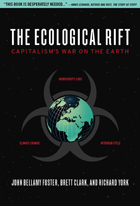The ecology of consumption -- excerpt from John Bellamy Foster, Brett Clark and Richard York's `The Ecological Rift'

October 20, 2010 – Links International Journal of Socialist Renewal, with the permission of Monthly Review Press, is excited to offer its readers an excerpt from the The Ecological Rift: Capitalism’s War on the Earth, an important new book by John Bellamy Foster, Brett Clark and Richard York. Links' readers are urged to purchase the book. Please click here to order your copy. You can download (in PDF) the chapter, "The ecology of consumption", below the following introduction, or read it on screen.
* * *
Humanity in the 21st century is facing what might be described as its ultimate environmental catastrophe: the destruction of the climate that has nurtured human civilization and with it the basis of life on earth as we know it. All ecosystems on the planet are now in decline. Enormous rifts have been driven through the delicate fabric of the biosphere. The economy and the Earth are headed for a fateful collision—if we don’t alter course.
In The Ecological Rift: Capitalism’s War on the Earth, environmental sociologists John Bellamy Foster, Brett Clark and Richard York offer a radical assessment of both the problem and the solution. They argue that the source of our ecological crisis lies in the paradox of wealth in capitalist society, which expands individual riches at the expense of public wealth, including the wealth of nature. In the process, a huge ecological rift is driven between human beings and nature, undermining the conditions of sustainable existence: a rift in the metabolic relation between humanity and nature that is irreparable within capitalist society, since integral to its very laws of motion.
Critically examining the sanguine arguments of mainstream economists and technologists, Foster, Clark and York insist instead that fundamental changes in social relations must occur if the ecological (and social) problems presently facing us are to be transcended. Their analysis relies on the development of a deep dialectical naturalism concerned with issues of ecology and evolution and their interaction with the economy. Importantly, they offer reasons for revolutionary hope in moving beyond the regime of capital and toward a society of sustainable human development.
John Bellamy Foster is editor of the US-based Marxist journal, Monthly Review. He is professor of sociology at the University of Oregon and author of The Ecological Revolution, The Great Financial Crisis (with Fred Magdoff), Critique of Intelligent Design (with Brett Clark and Richard York), Ecology Against Capitalism, Marx’s Ecology, and The Vulnerable Planet.Brett Clark is assistant professor of sociology at North Carolina State University. He is coauthor (with John Bellamy Foster and Richard York) of Critique of Intelligent Design.
Richard York is associate professor of sociology at the University of Oregon. He is co-editor of the journal Organization & Environment and coauthor (with John Bellamy Foster and Brett Clark) of Critique of Intelligent Design.
* * *
Click HERE to download (PDF) "The ecology of consumption" or read it on screen below.
the ecology of consumption is base on a false premise
I read the first paragraph of this. That is enough. I know very few Greens who de-emphasize "affluence" as a driver of environmental destruction. In fact they are more critical of affluence and consumerism than are socialists.
I also know few Greens who support laissez-faire capitalism.
So, the article is based on a false premise.
Pity you are spending so much effort to tear down worthy allies.
Nice synthesis
At our website (energybulletin.net), we've posted links to the work of John Bellamy Foster and other Monthly Review authors over the years, since they seem to be the most articulate of the socialist left when it comes to peak oil and resource depletion.
I wish it were possible to get the arguments across without a reliance on Marxist jargon. As with any jargon, it can make communication easier among specialists. To outsiders, however, the jargon is a barrier. Terms like "commodity fetishism," "reification" and "use value" are show stoppers when one wants to communicate with non-Marxists.
The blurbs for the book show that it is reaching an audience beyond the usual one. It helps that the book's authors have read people like Juliet Schor and Erik Assadourian of WorldWatch. Perhaps Marxism is emerging from its ghetto?
Some points I took away from the chapter:
* Changing patterns of individual consumption is important but insufficient. By focusing exclusively on individuals, we neglect the other consumers -- business, industry and government.
* If individuals reduce their consumption, their savings will be invested and cause further use of resources.
* The capitalist system depends on profits, and this drives consumption of all sorts. Movements which neglect this reality are doomed to frustration.
This Applies to Other Sources, Too
Check out the chapter by William Rees in The Post-Carbon Reader. It is entirely as awful as the Worldwatch annual. Never mentions "capitalism," and blames the whole planet co-equally:
http://www.deathbycar.info/hall-of-mirrors/
With allies like these, Bart, who needs enemies?
It might repay your effort to actually think, rather than pin medals on yourself and your "green" buddies.